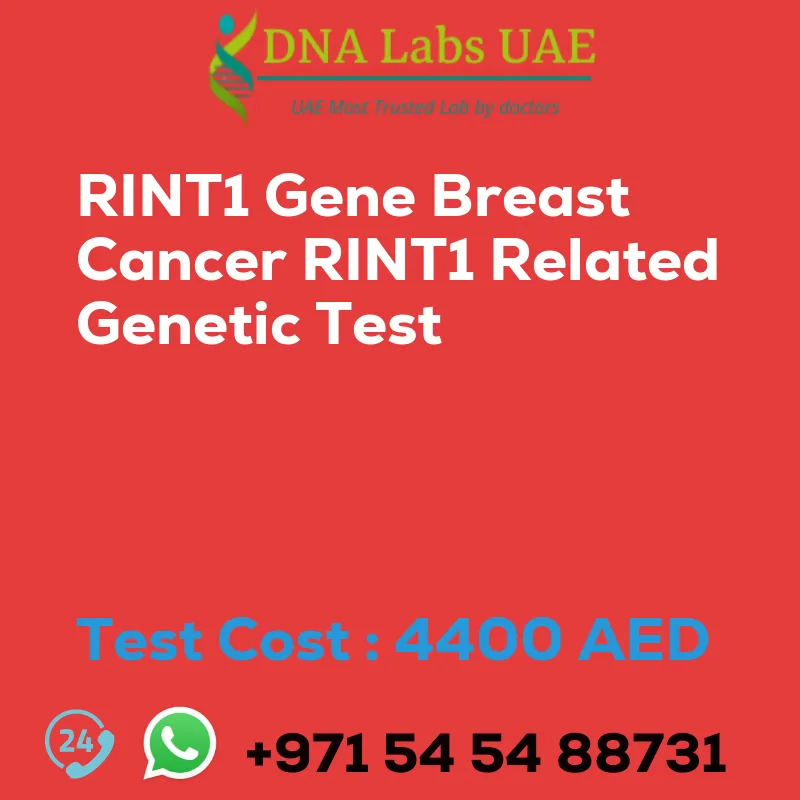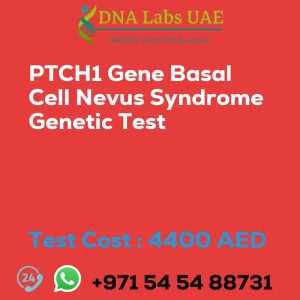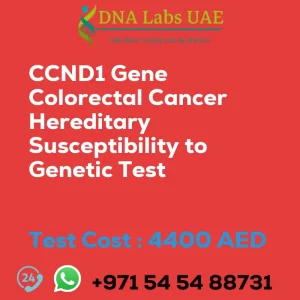RINT1 Gene Breast Cancer Genetic Test
At DNA Labs UAE, we offer the RINT1 gene breast cancer genetic test to help individuals assess their risk of developing breast cancer. This test utilizes Next-Generation Sequencing (NGS) technology to analyze the RINT1 gene and identify any mutations or variants that may be present.
Test Components and Price
The RINT1 gene breast cancer genetic test is priced at 4400.0 AED. The test requires a sample of either blood, extracted DNA, or one drop of blood on an FTA card.
Report Delivery and Method
After the sample is collected, the report will be delivered within 3 to 4 weeks. The test utilizes NGS technology for accurate and reliable results.
Symptoms and Diagnosis
Individuals who are considering the RINT1 gene breast cancer genetic test should provide their clinical history to the oncologist. Additionally, a genetic counseling session may be conducted to draw a pedigree chart of family members affected by RINT1 gene breast cancer. This information helps in understanding the patient’s genetic predisposition.
About the RINT1 Gene
The RINT1 gene is a tumor suppressor gene responsible for DNA repair and cell cycle regulation. Mutations in this gene have been associated with an increased risk of developing certain types of cancer, including breast cancer.
Test Details
The RINT1 gene breast cancer genetic test involves sequencing the RINT1 gene to identify any changes in the DNA sequence. This helps determine if an individual has an increased risk of developing breast cancer due to RINT1 gene mutations.
Personalized Cancer Prevention and Screening
The results of the RINT1 gene breast cancer genetic test provide valuable information about an individual’s genetic predisposition to breast cancer. This information can guide personalized cancer prevention and screening strategies.
Consultation with a Healthcare Professional
It is important to note that while RINT1 gene mutations have been associated with an increased risk of breast cancer, not all individuals with these mutations will develop the disease. Genetic testing should be performed in conjunction with other risk assessment tools and in consultation with a healthcare professional who specializes in cancer genetics.
| Test Name | RINT1 Gene Breast cancer RINT1 related Genetic Test |
|---|---|
| Components | |
| Price | 4400.0 AED |
| Sample Condition | Blood or Extracted DNA or One drop Blood on FTA Card |
| Report Delivery | 3 to 4 Weeks |
| Method | NGS Technology |
| Test type | Cancer |
| Doctor | Oncologist |
| Test Department: | Genetics |
| Pre Test Information | Clinical History of Patient who is going for RINT1 Gene Breast cancer, RINT1 related NGS Genetic DNA Test. A Genetic Counselling session to draw a pedigree chart of family members affected with RINT1 Gene Breast cancer, RINT1 related NGS Genetic DNA Test gene RINT1 |
| Test Details |
The RINT1 gene is a tumor suppressor gene that plays a role in DNA repair and cell cycle regulation. Mutations in the RINT1 gene have been associated with an increased risk of developing certain types of cancer, including breast cancer. RINT1-related NGS genetic testing refers to Next-Generation Sequencing (NGS) analysis of the RINT1 gene to identify any mutations or variants that may be present. This type of genetic testing can help determine if an individual has an increased risk of developing breast cancer due to RINT1 gene mutations. The test involves obtaining a sample of DNA, typically through a blood or saliva sample, and sequencing the RINT1 gene to identify any changes in the DNA sequence. The results of the test can provide information about an individual’s genetic predisposition to breast cancer and can help guide personalized cancer prevention and screening strategies. It is important to note that while RINT1 gene mutations have been associated with an increased risk of breast cancer, not all individuals with these mutations will develop the disease. Genetic testing should be performed in conjunction with other risk assessment tools and in consultation with a healthcare professional who specializes in cancer genetics. |








